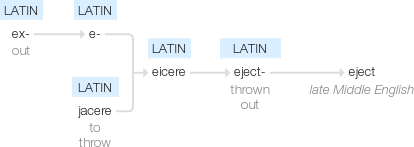Eject
late Middle English: from Latin eject- ‘thrown out’, from the verb eicere, from e- (variant of ex- ) ‘out’ + jacere ‘to throw’.
wiktionary
From Middle French éjecter, from Latin ēiectus, perfect passive participle of ēiciō(“to throw out”), or from ēiectō, the frequentative form of the same verb, from ē-, combining form of ex(“out”), + iaciō(“to throw”). [1]
From Latin ēiectum(“(that which is) thrown out”), from ēiciō(“to throw out”) (see Etymology 1). Coined by W. K. Clifford by analogy with subject and object.
etymonline
eject (v.)
mid-15c., from Latin eiectus "thrown out," past participle of eicere "throw out, cast out, thrust out; drive into exile, expel, drive away," from ex "out" (see ex-) + -icere, combining form of iacere "to throw" (from PIE root *ye- "to throw, impel"). Related: Ejected; ejecting. Ejecta "matter thrown out by a volcano" is from 1851.
